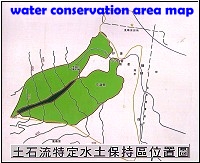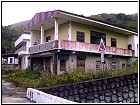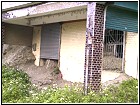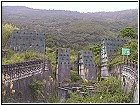| |
|
5. Main Events:
[Truku
Battle]
[Submerged
Tribe] |
|
(1) Truku
Battle
In 1895,
Japanese occupied Taiwan based
on Treaty of Shimonoseki, and
raised a series of fights
against Truku people in the east
during 1898-1916, as Japanese
believed Truku was not
compliable.
“Truku
Military Expedition Action” in
May 1914 was the one longest in
time and largest in scale.
Japanese put total over 200,000
land force and police, equipped
with new guns, canons and
ammunition and attacking Truku
with two routes of soldiers. The
east route started from Tongmen
and Wenlan and marched towards
west and north separatively;
west route appointed Zuo Jiu
Jian Ma Tai, the dey (then the
top director in Taiwan) as the
company’s commander, starting
from Puli, through foggy area
and Zhuifen (Currently, Cui
Mt.), and set up “Expedition
Command” that gathers about
10,000 soldiers and works as the
counterpart of east route army
that went against Liwu River via
Hualien harbor and Xin City.
When Truku
people only had 2300 sildiers
attending defending war, against
over 200,000 well-equipped
Japanese soldiers (police) with
vile hunting-arrow and guns. The
war lasted 60 days and the Truku
people were defeated eventually.
The war is
the biggest one in 20 century.
Both sides suffered severe
casualty, and Truku people paid
painfully for the war.
[Source: Information from Notice
Board of New Baiyang Rest
Station, Truku National Park, at
143 kilometers of Province
Highway No.8, Central
Cross-Island Highway]
[Picture 1, 2 and 3 are copied
from information on Notice Board
of New Baiyang Rest Station,
Truku National Park, at 143
kilometers of Province Highway
No.8, Central Cross-Island
Highway, taken on 8 Feb. 2007]
[Picture 4 is copied from the
picture by Mr. Yoshida Kimi,
Japan]
  |
|
(2) Submerged
Tribe
 At July end,
2001, the typhoon season, a warm
air mass was formed in the sky
of West Pacific, named as
Typhoon Toraji, attacking Taiwan
with abundant rainfall. That
night, downfall had poured down
for hours and residents were
waken up by panic screams like
”help”. Jiaxin’s (he is a grade
2 student in Fenglin Junior High
School) uncle shouted, and his
father woke him up and ran away
soon before the house submerged
by mud-rock flow accompanied
with huge sound. Belongings of
Jiaxin, like bag, cloth and
dolls disappeared in no time.
The most serious disaster in
Jianqing Village was incurred by
Typhoon Toraji. At July end,
2001, the typhoon season, a warm
air mass was formed in the sky
of West Pacific, named as
Typhoon Toraji, attacking Taiwan
with abundant rainfall. That
night, downfall had poured down
for hours and residents were
waken up by panic screams like
”help”. Jiaxin’s (he is a grade
2 student in Fenglin Junior High
School) uncle shouted, and his
father woke him up and ran away
soon before the house submerged
by mud-rock flow accompanied
with huge sound. Belongings of
Jiaxin, like bag, cloth and
dolls disappeared in no time.
The most serious disaster in
Jianqing Village was incurred by
Typhoon Toraji.
Reviewing the disaster of
mud-rock flow in Jianqing
Community, we can know two times
of severe disaster occurred from
the websit of Soil and Water
Conservation Bureau. One refered
to Typhoon Zeb in 1998, when
mud-rock flow occurred in
Jianqing Village, causing six
houses of the 5th neighbour of
Jianqing Village submerged; the
second refered to Typhoon Toraji
in 2001, mud-rock flow occurred in the
same place and total 8 houses
were submerged, as well as about
300 meters village road, when
slope protection and road
surface were damaged, roadbed
sank, culverts were choked or
shattered, over 10 hektares
farmland, a bridge, sand break
and bank prevention work was
submerged as well as sand-break
dam, foundation of drop
structure was exposed, and mud
and rock deposited. Residents of
Jianqing community profoundly
awared through the disasters
that environment protection and
soil and water conservation is
the basic belief and principle
of co-existance between human
and the nature.
mud-rock flow occurred in the
same place and total 8 houses
were submerged, as well as about
300 meters village road, when
slope protection and road
surface were damaged, roadbed
sank, culverts were choked or
shattered, over 10 hektares
farmland, a bridge, sand break
and bank prevention work was
submerged as well as sand-break
dam, foundation of drop
structure was exposed, and mud
and rock deposited. Residents of
Jianqing community profoundly
awared through the disasters
that environment protection and
soil and water conservation is
the basic belief and principle
of co-existance between human
and the nature.
 |
 |
 |
 |
|
Interview Guo, Mali,
the secretay of
Jianqing Village |
Unsafe houses in
villages that are
forced to move |
Mud-rock flow sweeps
(the home of Shi-wei
Yan) |
Banking project
renovation |
[Information source:
Soil and Water
Conservation Bureau’s
website:
http:
//debris.swcb.gov.tw]
  |
|
|